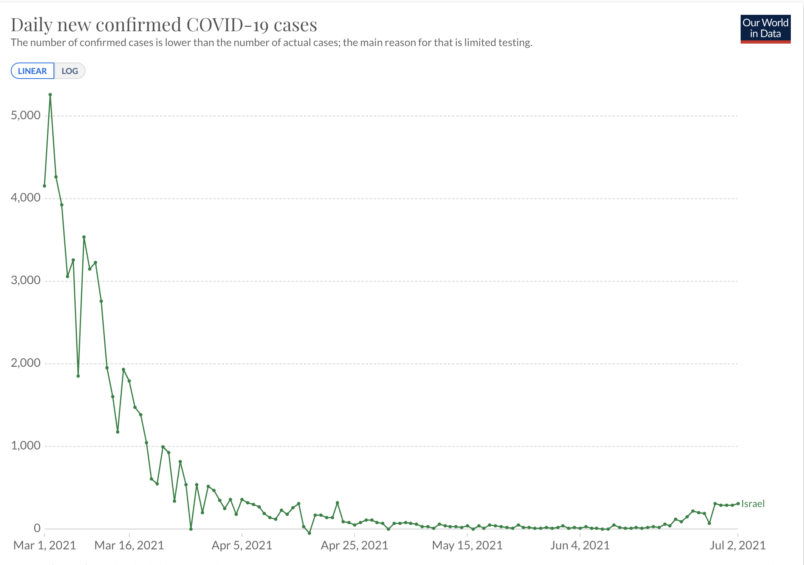In the United States, or at least in parts of it, we are moving into a post-COVID era. Or more accurately, we are moving into a post-Crisis COVID era. There’s still COVID. People are still getting sick. People are still dying. But in regions of high vaccination illness and severe disease are becoming rare enough and manageable enough that society can begin to function more or less as normal. Understanding the dynamics of this new era, the precise levels of vaccine efficacy, the specifics of asymptomatic disease and so forth have become a minor obsession of mine. And TPM Reader JL, an academic in the field, has been a helpful.
Here are some basic questions. How effective are the mRNA vaccines and how effective are they against the Delta variant of Covid? To the extent the vaccines are marginally less effective against Delta, do they continue to provide very high levels of protection against symptomatic and severe disease?
There’s one additional question that is technical but will become increasingly key to understand as societies judge how much COVID in the population is acceptable. We’ve heard a lot about ‘long covid’ and various forms of longterm or permanent damage caused by the disease. Do those happen in mild or asymptomatic cases? It seems like probably not or at least not often. But we don’t really know. It’s a very hard set of parameters to study.
Here’s why that’s important. There’s a very low level of ‘breakthrough’ cases of COVID in Israel currently. Mostly they’re from the Delta variant. I haven’t been able to get clear and definitive information on this. But I’ve seen evidence and references that suggest that few or perhaps close to none of those cases in fully vaccinated persons are symptomatic. There’s also a lot of evidence that these few breakthrough cases shed very little virus. So they’re probably not contributing much to spread. If all this is true, maybe it just doesn’t matter. Few if any of these people are “getting sick” in any real sense. They’re just generating a positive PCR test. If they have no symptoms, no longterm health effects and are responsible for little to know spread, who cares?
What we don’t know is if those cases are causing any longterm physical damage. We don’t have evidence that that is the case and there seems to be a logical argument that it’s probably not the case. But we don’t actually know. And at a society-wide level, that’s important to know if you are in charge of making society-wide policy about how much COVID prevalence is okay.
Now let’s turn to the specifics of the situation in Israel. As we’ve discussed, spread in the country all but went to zero. Then the Delta variant arrived. That led cases to go from single digits a day to two or three hundred a day – a big percentage spike but still quite low in absolute terms.
This has led to a lot of confusion about just what’s happening in the country and how it relates to the efficacy of vaccines in a highly vaccinated country. For instance, a Politico newsletter said a few days ago that “cases in Israel have soared recently even among vaccinated people because of the Delta variant first detected in India.”
‘Soaring’ has no absolute definition. But that’s very misleading. The percentage increase is high but the absolute numbers are extremely low and they’ve actually stopped rising. There have also been various reports that as many as half of new cases are in people who are fully vaccinated. This is often presented as evidence that the vaccines are failing or producing significantly reduced efficacy. But that’s not true. We need to interpret this data correctly. When the vaccine is working effectively in a highly vaccinated country you’re likely to see low absolute numbers but fairly high percentages of the cases in people who are vaccinated.
Perhaps the most instructive data are these daily COVID numbers in the country. The government has repeatedly warned that the number of cases is going to grow substantially. And that may certainly happen. A few days ago state health authorities warned people to expect the number to triple in a week. But look at the actual data so far.

This trajectory certainly doesn’t tell us the numbers will remain low. But it definitely suggests that the country’s density of vaccination appears to be preventing the sort of exponential growth we’ve seen in successive ‘waves’ of COVID in outbreaks across the globe. It may continue to creep up. But these numbers suggest a strong society-wide wall even against the Delta variant. It’s not an absolute one but one that appears to be a real obstacle to exponential growth. And it’s worth remembering that only just over 50% of the overall population in Israel has been vaccinated. So there’s still a lot of improvement that could be made.
This of course applies severalfold in parts of the United States with particularly low vaccination rates and in many cases rapidly rising rates of COVID infection, hospitalization and mortality.






